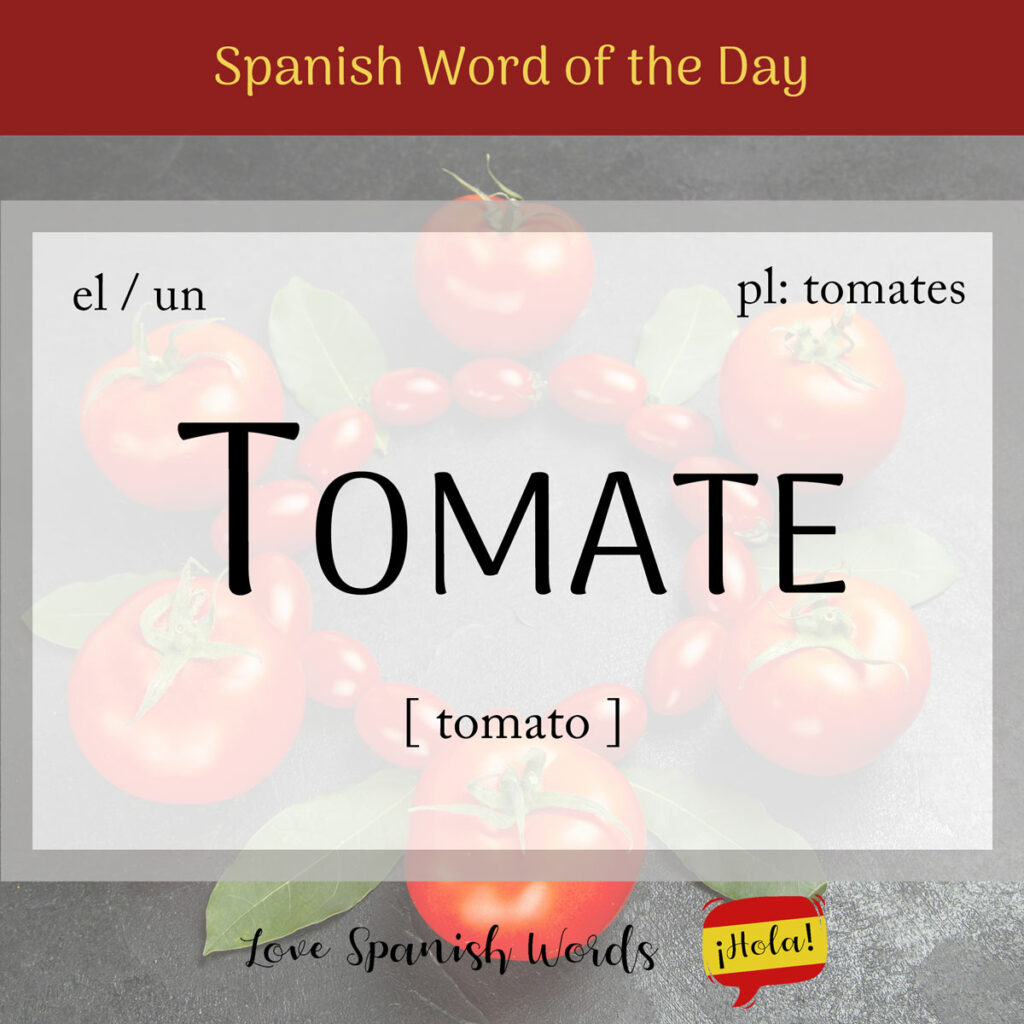The base ingredient in so many of our favourite recipes, the tomato or tomate in Spanish, has a colourful history.
The Nahuatl or Aztec word for tomate was tomati and it meant plump fruit with the tomato proper being jitomate or xitomatl. The word jitomate is still used today in Mexico to refer to the red tomato and the word tomate or tomatillo is used for the green tomato (tomate verde).
When in the 16th Century the Spanish conquerers (conquistadores) reached the Americas they found the indigenous peoples of Mexico cultivating the plant and took the name tomate and the fruit back to Europe.
The voyages of Columbus also introduced maiz (corn), patatas (potatoes), pimientos picantes (chilli peppers) and batatas (sweet potatoes) to Europe.
Latin American Pronunciation
European Pronunciation

Tomate is a masculine noun and takes the following definite and indefinite articles:
- el tomate = the tomato
- los tomates = the tomatoes
- un tomate = a tomato
- unos tomates = some tomatoes
Mi abuelo cultiva tomates en su huerto.
My grandfather grows tomatoes in his vegetable garden.

Fun fact…
Somebody who grows or sells tomatoes is called a tomatero.
There are hundreds of different varieties of cultivated edible tomatoes nowadays, the most common of which fall into these main categories: tomate en rama (vine tomato), tomate cereza (cherry tomato), tomate pera (plum tomato), tomate corazón de buey (beef tomato), tomate de árbol (tree tomato/tamarillo).
Even before you consider the many dishes that have a tomato base, there are many ways of preparing the tomatoes before cooking, either to preserve them or to make them more usable in recipes:
- puré de tomate = tomato puree
- tomate triturado = crushed tomatoes
- tomate picado = chopped tomatoes
- tomate frito = unconcentrated puree made by frying peeled tomatoes
- salsa de tomate = tomato sauce (or ketchup)
- zumo/jugo de tomate = tomato juice
Some of the most common ways of serving tomatoes and also some of the most common dishes with a tomato base include:
- pan con tomate = bread with tomato, usually served with garlic and olive oil
- tomate asado = baked tomato
- sopa/crema de tomate = tomato soup
- tomate en rodajas = sliced tomatoes
- pisto = vegetable stew with a tomato base
- gazpacho = tomato based soup served cold
In Spain, the word tomate is also used to describe a hole (agujero) in a garment such as tights, socks or gloves. (This can also be called a papa (spud), slang for potato.)

Fun fact!
The popular card game Julepe is also known as tomate.
This game is played with a 40 card Spanish deck and involves 6 players trying to win ‘tricks’.
The game originated in Spain, spreading rapidly throughout large areas of Latin America during the 19th Century.

La Tomatina is a famous festival in Buñol, Spain, where participants engage in a massive tomato fight. Held on the last Wednesday of August, it draws thousands of people from around the world. Originating in 1945 from a local food fight, it is now highly organised with safety rules like crushing tomatoes before throwing. The festival also features parades, music, and fireworks. Inspired by La Tomatina, similar events occur in some Latin American countries, such as Sutamarchán, Colombia, and Quillón, Chile, where annual tomato-throwing festivals attract both locals and tourists.
Some common idioms with ‘tomate’:
Ponerse como un tomate
Literal translation: to become like a tomato
English meaning: to go as red as a tomato from embarrassment (vergüenza)
Poner a alguien el culo como un tomate
Literal translation: to put somebody’s rear end like a tomato
English meaning: to badly beat somebody
A la mejor cocinera se le va un tomate entero
Literal translation: even the best cook can let a whole tomato slip
English meaning: nobody is perfect/everybody makes mistakes
One final mention of a colloquial use of the word tomate: it can mean a fuss or a commotion (jaleo) and/or a snag or a catch.

